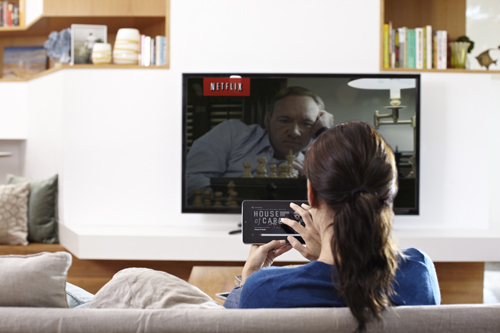Netflix CEO criticises ISP video streaming fees
Reed Hastings hits out against "interconnection fees" charged by internet service providers to ensure high quality video streaming

The latest hi-fi, home cinema and tech news, reviews, buying advice and deals, direct to your inbox.
You are now subscribed
Your newsletter sign-up was successful

Netflix CEO Reed Hastings has criticised internet server providers (ISPs) for acting against the principle of "net neutrality" by charging the firm to ensure high video streaming quality.
Reports suggest that a deal signed last month between the on-demand video provider and US ISP Comcast included a fee paid by Netflix to ensure a "high-quality video experience".
BLOG: Amazon and Netflix are changing the TV landscape
A statement issued at the time, however, claimed that Netflix wouldn't receive any "preferential network treatment under the multi-year agreement, terms of which are not being disclosed".
Hastings has now used the official Netflix blog to express his disapproval at the "big ISPs" that aren't providing "sufficient interconnectivity" to give its customers high video quality.
MORE: Netflix to invest $3bn on expanding TV and film content in 2014
He said: "Once Netflix agrees to pay the ISP interconnection fees, however, sufficient capacity is made available and high quality service for consumers is restored.
The latest hi-fi, home cinema and tech news, reviews, buying advice and deals, direct to your inbox.
"Without strong net neutrality, big ISPs can demand potentially escalating fees for the interconnection required to deliver high quality service."
Netflix is also said to be in talks with Verizon over a interconnection deal, with the company set to "reluctantly pay large ISPs to ensure a high quality member experience" in the short term.
With Netflix working on the introduction of 4K streaming video, however, it may bring them into further conflict with ISPs if the service is going to require an increase in data consumption.
EYES-ON: Netflix 4K streaming review
by Pete Hayman
Pete was content editor on What Hi-Fi?, overseeing production and publication of digital content. In creating and curating feature articles for web and print consumption, he provided digital and editorial expertise and support to help reposition What Hi-Fi? as a ‘digital-first’ title; reflecting the contemporary media trends. He is now a senior content strategist.
